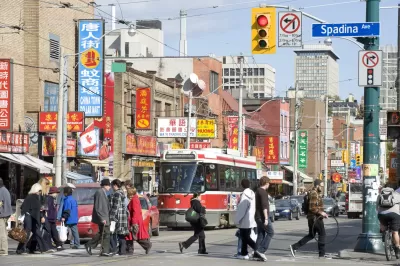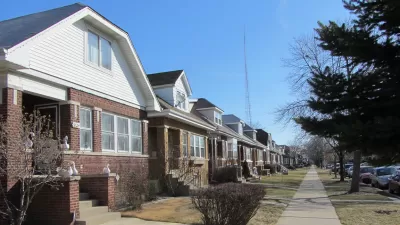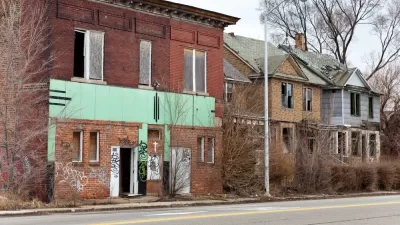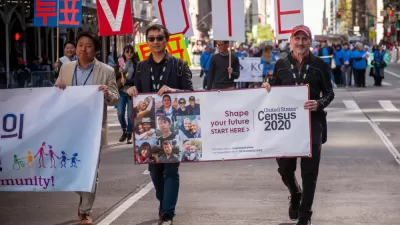A closer look at the numbers reveals stark divides among Toronto neighborhoods.

A new study of Canadian census data shows significant racial and income segregation throughout Toronto. The lowest-income neighborhoods, with average incomes less than $32,000, make up almost half of the city's census tracts, and 68 percent of residents in these neighborhoods are non-white. On the other hand, 23 percent of Toronto's census tracts include neighborhoods with average incomes of $102,000, and two-thirds of these residents are white.
These findings indicate that financial resources give people access to particular neighborhoods. But other issues might also be in play, writes Sandro Contenta:
Choice also partly explains the makeup of low-income neighbourhoods. Some members of ethnic groups prefer to live where their communities are most numerous, giving them easy access to the shops and cultural or religious services that facilitate integration or simply make life more enjoyable.
However, the study also found that half of residents in these neighborhoods have post-secondary degrees, and they say this relatively high percentage of educated residents with low incomes suggests discrimination is playing a role in the disparities. In addition, 57 percent of low-income neighborhoods are made up of immigrants as compared to 31 percent of high-income neighborhoods.
Researchers have pointed to institutional factors that have contributed to the demographic landscape of Toronto:
The polarized income trend dates back to the 1990s, caused by federal and provincial cuts in transfer payments and social assistance, along with tax cuts, rising housing costs and the disappearance of well-paid manufacturing jobs, [researcher David] Hulchanski says.
They argue that government policies are needed to reverse these segregation trends and avoid the sort of social and political conflict seen in European countries.
FULL STORY: Toronto is segregated by race and income. And the numbers are ugly

Alabama: Trump Terminates Settlements for Black Communities Harmed By Raw Sewage
Trump deemed the landmark civil rights agreement “illegal DEI and environmental justice policy.”

Study: Maui’s Plan to Convert Vacation Rentals to Long-Term Housing Could Cause Nearly $1 Billion Economic Loss
The plan would reduce visitor accommodation by 25% resulting in 1,900 jobs lost.

Planetizen Federal Action Tracker
A weekly monitor of how Trump’s orders and actions are impacting planners and planning in America.

Wind Energy on the Rise Despite Federal Policy Reversal
The Trump administration is revoking federal support for renewable energy, but demand for new projects continues unabated.

Passengers Flock to Caltrain After Electrification
The new electric trains are running faster and more reliably, leading to strong ridership growth on the Bay Area rail system.

Texas Churches Rally Behind ‘Yes in God’s Back Yard’ Legislation
Religious leaders want the state to reduce zoning regulations to streamline leasing church-owned land to housing developers.
Urban Design for Planners 1: Software Tools
This six-course series explores essential urban design concepts using open source software and equips planners with the tools they need to participate fully in the urban design process.
Planning for Universal Design
Learn the tools for implementing Universal Design in planning regulations.
Caltrans
Smith Gee Studio
Institute for Housing and Urban Development Studies (IHS)
City of Grandview
Harvard GSD Executive Education
Toledo-Lucas County Plan Commissions
Salt Lake City
NYU Wagner Graduate School of Public Service





























